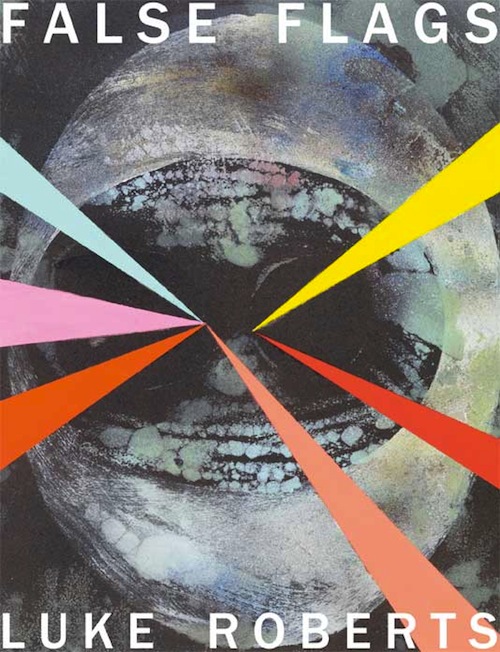The False Flags of Luke Roberts

UK poet Luke Roberts has just published his first widely available collection of work, entitled False Flags (Mountain Press 2011); and Rich Owens has reviewed the book at Damn the Caesars. A bit about the book from the publisher:
False Flags was initially conceived as a satire or part-satire on conspiracy theories and New Age irrationalism starting at Ground Zero and stretching back to the space race and other territorial contests of the past fifty years or so. The resultant text is a sequence of nine poems, including both short and extended lyrics, pseudo-narratives, and other mutating travesties. All the characters in the poem are real.
Owens goes further, explaining what a "false flag" might be:
On the day Luke Roberts's False Flags ... arrived Foreign Policy magazine reported that Israeli Mossad agents have been posing as US spies in an effort to recruit members of the Pakistani militant organization Jundallah in order to wage a covert war against Iran. Such an operation is a "false flag" operation which, as Roberts points out in a closing note to False Flags, "is a manoeuvre by which one group incriminates another, usually in an act of sabotage or violence."
He also looks closely at the work:
False Flags takes up questions of strength, ambition, belligerence and violence. A line from the opening poem "Colossal Boredom Swansong" states, somewhat bluntly, "the weak slap down the strong," reminding us of those horrifyingly well-known lines from Yeats's speculative comments on the second coming: "The best lack all conviction, while the worst | Are full of passionate intensity." And like Yeats's "Wild Swans at Coole," Roberts's swansong features a narrator saddened by "those beautiful creatures" who, instead of alerting one to the passage of time, serve only to signal a species of flight we all participate in destroying. As such, swans become an object of hate:
Every starling I see I will kill with my brain-mask, my weak
hand strangled by the jury, whose task must be to shine
through to the hurtful limit. Twelve or so I thought, the rest
caught by public confession to betrayals they didn't
fight. I accept everything, every tiresome imitation of flight.A lot is happening here, far more than I can now reasonably address, but the final statement in this first poem appears to set the tone for the whole of the book, this surrender to simulated flight, from cosmonaut Yuri Gagarin's inaugural 1961 voyage into space, to the 1986 Challenger disaster, to the flights that leveled the twin towers. In each instance the same "passion and conquest" that "attends upon" Yeats's wild swans also attends upon these, but tiresomely, violently. This passion is the passion of the weak and the worst and their efforts at flight can bear no more than a misguided trace of the flight they so desperately pantomime. Situated as a sort of prolegomena, "Collosal Boredom Swansong" is, as a lyric whole, a fairly extraordinary thing, an abject stretch of scorched earth where "Galileo swoops from the sky and kills the whole farmyard, | tearing the throats of geese with his universe, holding | down pigs, ripping the tails from rabbits to fashion | a new love."
Read the full review here ("I mean, the pleasure I find myself taking in this poem is no different than the incredible pleasure I first found in, say, Crane or Moore or Pound however long ago").


